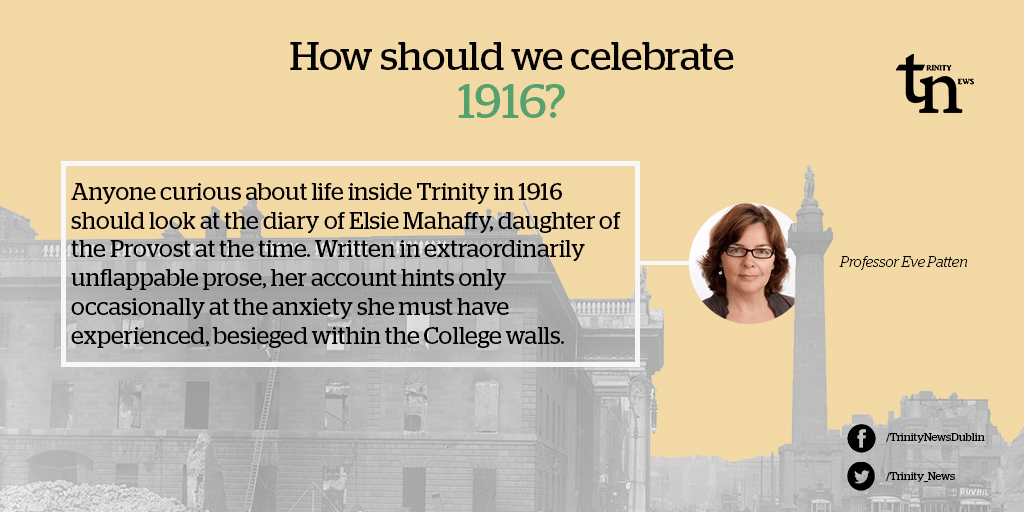Minister for Arts, Heritage and the Gaeltacht, Heather Humphreys TD recently launched Trinity’s 2016 programme of events, ‘Trinity and the Rising.’ The programme includes lectures, tours, a relaunch of the free and online MOOC run by the Department of History, the Changed Utterly blog hosted by Trinity Library, a debate hosted by the Historical Society, and a public reading of the 1916 Proclamation on the steps of the Dining Hall on March 15.
Trinity News invited a selection of the individuals taking part in these events to respond to the question of how they think 1916 might best be commemorated, and what responsibility Trinity has to Ireland’s histories. The first installment of this series is an account from Associate Professor in the School of English, Eve Patten.
Professor Eve Patten
Over the past year it has been inspiring to see Trinity taking a lead not only in commemorating the Rising, but also in assessing how it was perceived and continues to be perceived. People talk of ‘commemoration fatigue’ when really the opposite is true: colleagues across several disciplines – historians, literary critics, librarians, sociologists – have been energized by the challenge. It’s an opportunity to integrate our work with a common focus, and perhaps to remember that academics in many countries lack what we take for granted, which is the liberty to evaluate and reinterpret our political evolution.
My own research explores how various writers, from Arthur Conan Doyle to Roddy Doyle, have addressed the Rising over the past century. W.B.Yeats’ poem ‘Easter 1916’ is often regarded as the definitive literary response to the subject but numerous very different works have followed since. Sean O’Casey’s 1926 play The Plough and the Stars, for example, satirises Pearse’s rhetoric as a backdrop to the plight of a working-class Dublin family; Liam O’Flaherty’s Insurrection (1950), depicts a young man casually caught up in what looks like a ‘boy’s own’ adventure, with no sense of its political motivation. The 2005 novel A Long Long Way, by Trinity English graduate Sebastian Barry, portrays a bewildered Irish soldier returning from the trenches to find he must turn his weapons on his fellow countrymen. These imaginative versions of the era provide a sense of the contemporary social hinterland that often gets lost in official retrospectives.
Anyone curious about life inside Trinity in 1916 should look at the diary of Elsie Mahaffy, daughter of the Provost at the time. Written in extraordinarily unflappable prose, her account hints only occasionally at the anxiety she must have experienced, besieged within the College walls. Her entry for Wednesday of Easter week, when the heavy guns started pounding the city, is one such moment: “even the solid Provost’s House tremble,” she wrote, “and in the garden all the birds who had sung and warbled sweetly through all the previous noises, became mute, huddling together in terrified clusters.” This is a very literary image, a metaphor for the fear she couldn’t express, even to herself. And it exemplifies how the textual traces of the Rising – not only novels and poems but letters, diaries, military records and witness statements – require careful critical reading, not just retrieval, before we can draw them into the narrative of commemoration.
Eve Patten is an Associate Professor in the School of English. She will discuss ‘The Novel and 1916’ on 19 January 2016, at the first in the School of English Evening Lecture Series: Literature and Revolution.







